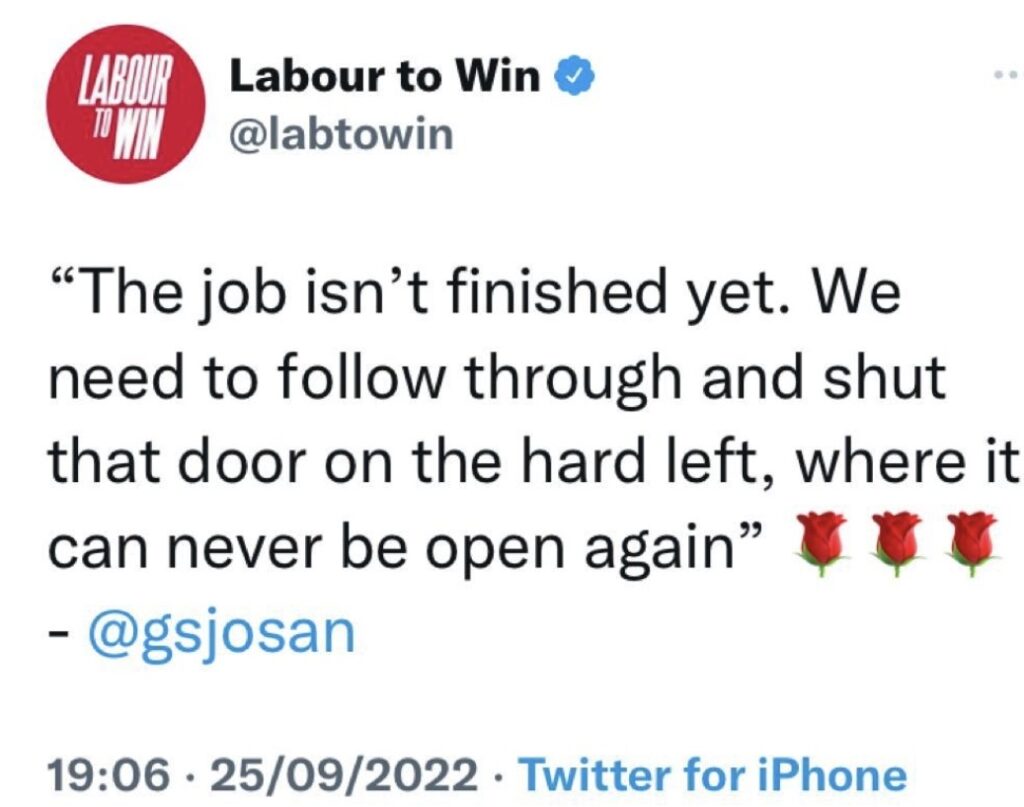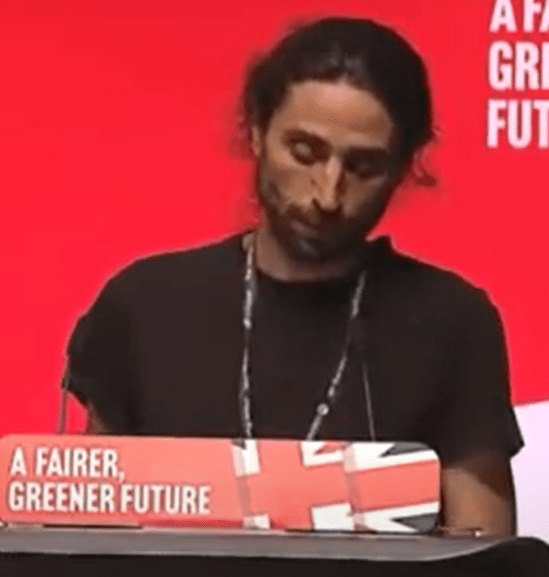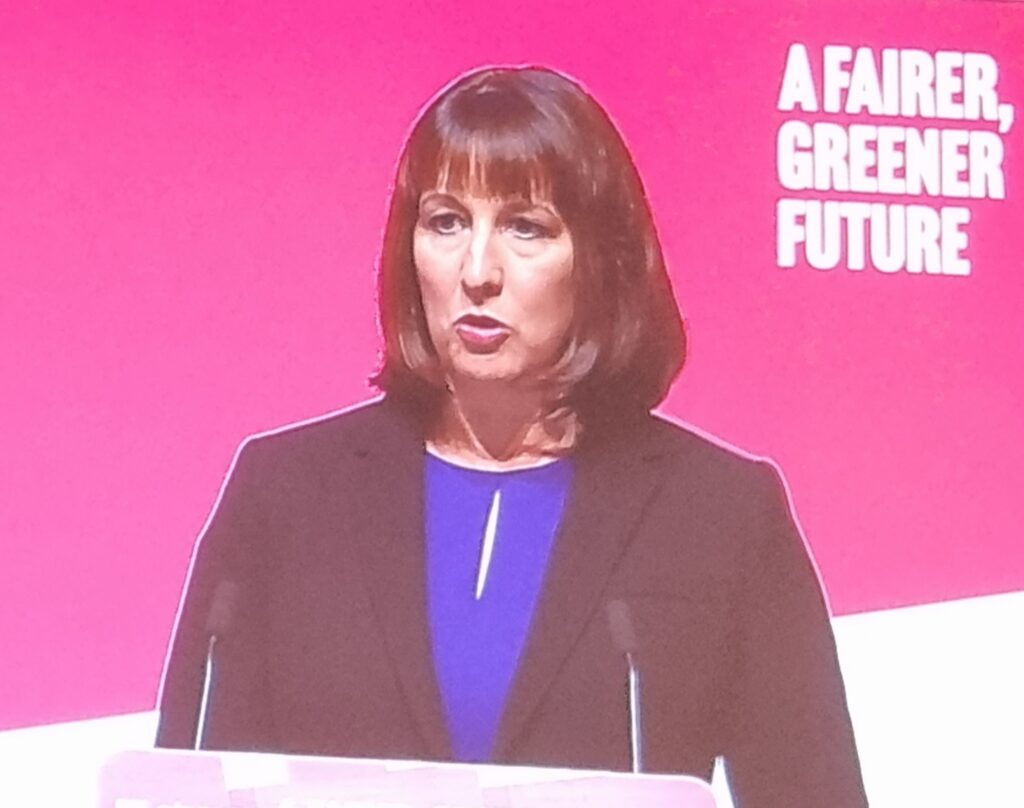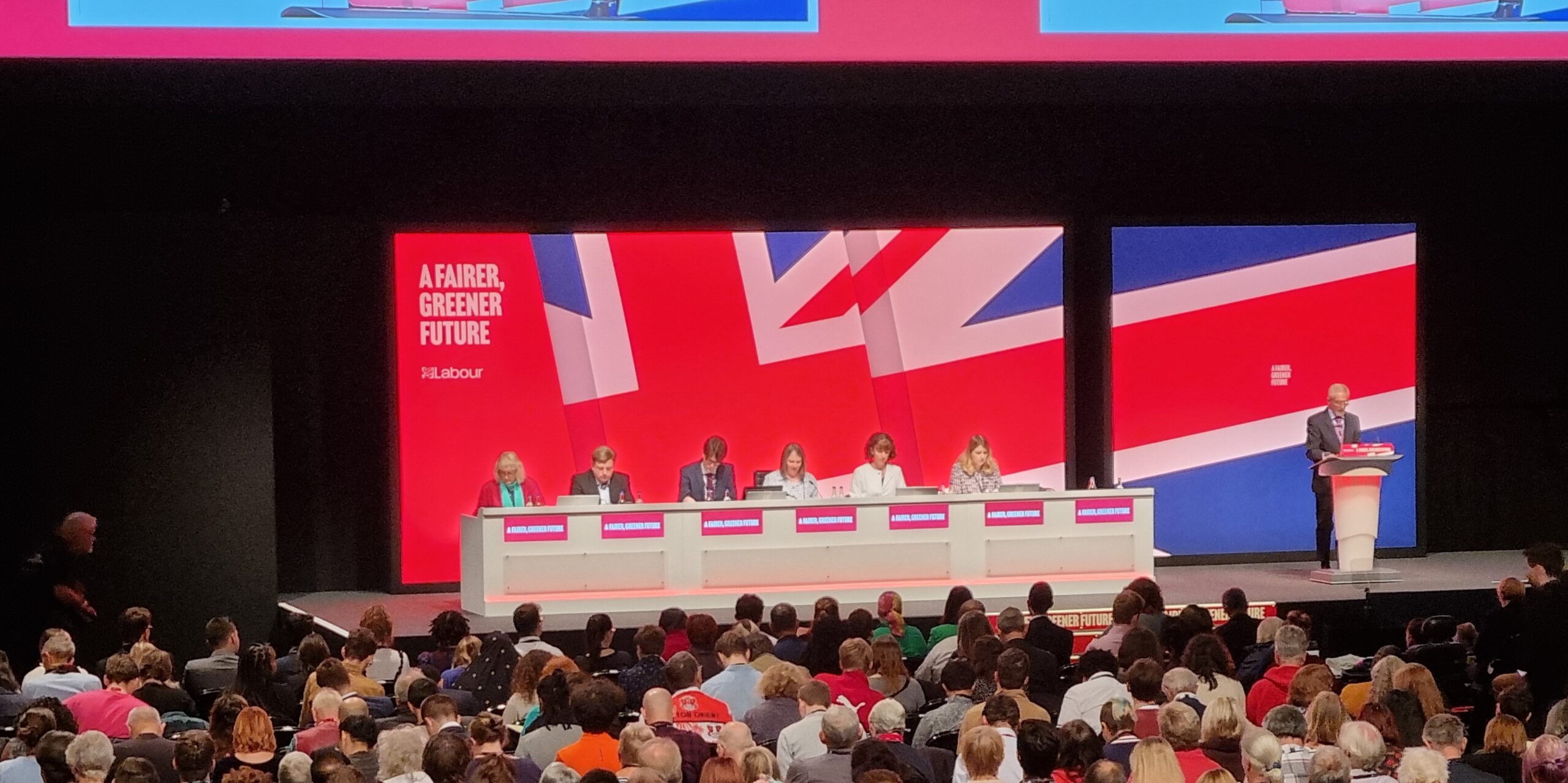It is important for socialists and Labour Party and trade union activists to have a sober and balanced appraisal of last week’s Labour Party conference. As economic storms raged in the real world outside, in the Liverpool conference centre the outlines of a future Labour government came into clearer focus. Given the economic fallout from “Kamikwasi’s” mini-budget last week, a general election may well come a lot earlier than 2024.
This conference was different to last year’s in that it firmly established the right wing in control. It even changed over the first two days, as right-wing constitutional amendments were carried and right-wing candidates won elections to various positions, including the NCC. A left constitutional amendment aimed to provide a way for Jeremy Corbyn to get back into the Party was defeated. The right-wing mis-named ‘Labour to Win’ group were cock-a-hoop, as the left was literally pushed to the fringe.
In the conference exhibition, there was the largest attendance by businesses since 2010. According to the Financial Times, “there were 600 attendees at one business reception on Tuesday night alone…Labour said it raised over £200,000 from corporate sponsorship arrangements at conference”. The CWU union might have been in the exhibition, but so was the company trying to destroy it, Royal Mail, as well as banks, right-wing newspapers, and even Sky and GB News.
Bureaucracy, manoeuvring and dirty tricks
For a long time the right-wing have actively organised to stifle the left. Thousands of lefts have been expelled and the more prominent the individual, the more likely they were to be ‘investigated’, like Naomi Wimborne-Idrissi, only just elected to the NEC. CLPs have been suspended by the score and notwithstanding the impact on party finances, the right-wing are overjoyed that two hundred thousand, mostly left members, have walked away.
Even more than last year, duly elected CLP delegates to conference were denied credentials on spurious grounds, like (wrongly) being told their subs were “in arrears”. Some didn’t even receive the rail tickets they’d paid the party for.
It was not surprising, therefore, that in the conference itself the right were in a majority, even in the CLP section. By Tuesday afternoon’s planned speech by Keir Starmer, the right wing had already won the conference. To get a rousing reception, as the Guardian sketch writer said, Starmer only had to turn up and not fall over.

It has taken Starmer and his right-wing backers two and a half years to succeed, but he has changed the leadership and even to some extent the Party itself, into New Labour Mark II. This was as we anticipated, even during the leadership contest, although there were some good party members who swallowed his pitch about ‘unifying’ the party. Since his election he has ditched his 10 pledges and packed his shadow cabinet with the old-guard right-wing.
We commented last year that the delegates’ podium at the LP conference reflected the real life experiences of the working class: on low pay, poor housing, overwork in the public sector, job insecurity and all the different elements of the precariousness of everyday life. That was still the case this year, but to a much more limited extent. As the conference proceeded, the podium was increasingly dominated by councillors, Prospective Parliamentary Candidates, Police and Crime Commissioners and other notables. The chair was selecting speakers from a list, rather than randomly from the body of the conference.
Unlike in previous years, Palestinian rights were pushed aside
Although sections of some resolutions – often agreed overwhelmingly on a show of hands – reflected similar demands to previous years, notably the £15 an hour national minimum wage, renationalisation of Royal Mail and the railways, insourcing of contracts in the public sector, and others, they stood out less and were more limited.
Last year, a resolution was passed that was critical of the state of Israel, using the ‘A’ word, (“apartheid”) and calling for support for sanctions against Israel. It was passed overwhelmingly on a show of hands. This year, support for Palestine was limited to a reference back where the vote was close on a show of hands (some said it passed) and when a card vote was called, the chair refused.

A resolution on Ukraine, moved by the GMB, while expressing some sentiments that workers would support, was generally couched in the language of full-throated support for NATO, which socialists would not support. No doubt with a nod toward GMB members employed in the defence industries, it even included a call for “an increase in funding for UK defence manufacturing.” A young delegate who tried to speak against this resolution was subsequently suspended from membership, another indication of the right wing’s idea of ‘democracy’.
Given the composition of the conference floor, the character of the resolutions passed, the many presentations of shadow cabinet speakers and not least the “centre ground” speech of Keir Starmer, it is extremely naïve of the left-wing group, Momentum, to suggest that “socialist policies are now the mainstream in the Party”. In a circular to members. Momentum noted that “Delegates passed motions on a £15 per hour minimum wage, public ownership of rail & mail, proportional representation, and an end to NHS privatisation. Similarly, the Labour Leadership’s announcements of rail nationalisation and a new publicly owned green energy company are a welcome counter to the Tories’ failed status-quo”.
Leadership still ignore call for £15 minimum wage
All of this is true, but similar (or better) resolutions were passed only last year and they were studiously ignored by the leadership, as the £15 minimum still is this year. It may be ‘mainstream’ to the man and woman in the street, but not to this Labour leadership.
It was notable that the leadership’s commitment to green policies was in the context of several CLP motions on the green new deal having been manoeuvred off the agenda (“rigged”, as one disgruntled delegate put it), so as not to widen commitments too much. And nor can we forget the Union Jack backdrop, the tributes to the Queen and the national anthem.
What were the policies offered and what do these commitments imply? Keir Starmer, Rachel Reeves and other shadow ministers announced at various times a big raft of commitments, all of them very popular with the conference, as they will be with the electorate. These were for a publicly-owned railway system, a state-owned energy company, a publicly owned rail system, a National Wealth Fund, investment in green technologies and industries, zero carbon economy by 2030, ‘insourcing’ contracts back into the public sector, free breakfast clubs for all primary children, and many more.
Great British Energy will not be a supplier
But it was only because of the pressure of the membership of the trade unions that these policies were adopted at all. Albeit in a weakened and distorted form, the union delegations, even in the right-wing unions, reflected the terrible pressures of everyday life on their membership. It is inevitable that the economic storm raging outside the conference would have some effect, therefore, even on the Labour leadership.

It was only by announcing popular reforms that the leaders were cheered by conference. In the past the Labour right wing would have been uncomfortable even talking about “class”, but in Liverpool every shadow minister, from Starmer down, peppered their speeches with reference to the “working class”. Under the circumstances it could not have been any other way. The leadership have had to ‘talk the talk’ and as a minimum to try to present reforming policies on their own terms. What is said at conference and what is put in the next general election manifesto may be two completely different things.
We should make it clear that no socialist should be opposed to reforms. There is still a lot of ambiguity about how some policies might work: the National Wealth Fund, the state-owned energy company and how a state-owned rail system would evolve.
To take one specific example, conference delegates thought that Great Britain Energy would compete with the energy giants. That was the impression the leadership wanted to give. But Labour’s spokesperson Jonathan Reynolds, the day after the conference, made it clear to Utility Week that BGE “will not be a supplier”, but a ‘manager’ of investments. It will be a Labour government facilitating the profits of the energy giants.
Labour are looking like winning the next general election
It is true that some of the promised reforms would be very welcome and have the potential to make a difference to the lives of working-class people. It is the promise of reforms – commitments to improve the lives and working conditions of working-class people – that are likely to win Labour the next general election. That and the dire situation faced by voters because of Tory policies.
But there are two problems with the promises made by Starmer and his shadow ministers. The first is that they are not nearly enough. Working class households face the most serious challenge to their stability and security than at any time since the Second World War. Measures that tinker around the edges, as many do, will not significantly make workers better off, or even stabilize their lives.
The second problem is more fundamental. Underlying all of the good promises made by the leadership is the overarching idea, principally voiced by Rachel Reeves and Keir Starmer, that Labour is the now the party of “fiscal responsibility”. Every reform and policy will be costed before it is implemented. Historically, it has been Tory chancellors who have thrown money around (mostly at their friends) and Labour chancellors like Gordon Brown who have kept the purse strings tight.
If and when Labour is returned to office, it will be a government of crisis from the very beginning. The right-wing may think it is 1997, but it is not, politically, socially and, above all, economically. The economic position of British capitalism is far worse than it was then and that will impact on any new government.
Labour will inherit a whirlwind of economic problems and from the start they will be put under enormous pressure to impose huge cuts in public services and living standards generally, precisely in order to demonstrate their “fiscal responsibility”.
Keir Starmer dropped his 10 pledges in the blink of an eye. Under the sustained pressure of the Bank of England, the money markets, the media and the combined cohorts of high-ranking government department civil servants, Keir Starmer will just as easily drop the majority if not all of his policy pledges.
When big business speaks, Starmer will be a willing listener
In the final analysis, it is economics that determines politics. An incoming Labour government will not see Starmer dictating to capitalism; it will be capitalism in crisis dictating to Starmer. And in the new Prime Minister and his chancellor Rachel Reeves, capitalism will find ears more than willing to listen. A few token reforms here and there will be offset by economic and social policies as bad as any carried out by Cameron, May, Johnson or Truss.

Does that mean that for us the Labour Party is finished? Far from it. We should not make a judgement like those on the left who see only the tops of the party. They are like a man who looks up when there is an earthquake, when it is the ground beneath his feet that is moving.
All of the gains for the right in recent years, including the election of Starmer in 2020, have been premised on the promise of change for the better. The difficulty is, as we have outlined, is that when push comes to shove, the right wing will have nothing to offer beyond words.
A Labour government of crisis, forced by the bankers and the press to implement counter-reforms, will provoke an unprecedented wave of anger inside the Party and in the trade unions. The left were at the fringe of this conference in a literal sense. Three very large left fringe events were proof of that. The rallies organised by Enough is Enough, the Tribune and the Campaign Group of MPs were all enthusiastic and well attended events.
What we still have at the moment is a sizeable and viable, if somewhat chastened, left. Despite the hopes of the ultra-lefts, there is no prospect of a new ‘left party’ outside of the Labour Party any time soon. In the storm of events following the election of a Labour government, there will be fierce resistance to the inevitably back-sliding on last week’s conference promises and policy commitments. And that resistance will be manifest inside the Party and the trade unions.
The more a Starmer/Reeves government gives way to the demands of the market and the banks, the greater will be the howls of rage from ordinary Labour and trade union members. In that atmosphere, genuine socialist ideas will get an echo once again. The right-wing are crowing over conference today, but they will be cringing in the corners tomorrow.
The fight for socialist ideas inside the Labour Party will be effectively on hold for the moment. It will be difficult, although not impossible to build the Labour left. The key to the resurgence of socialist ideas in the Party is the trade union movement, which voted overwhelmingly for the right on every card vote. The union that made the most strident noises at the conference was the CWU. Labour’s largest affiliate, Unite, was relatively quiet.
Unite leadership has played a much smaller role
Although Unite has made magnificent strides in fighting for its members on the industrial front, we have to say that Sharon Graham’s effective abandonment of the struggle inside the Labour Party is a disgrace. We expected the three large right-wing unions, UNISON, USDAW and the GMB to make sure the boat wasn’t rocked at conference. They play a double game, saying one thing to their members and another thing on the side to Keir Starmer. But we were entitled to expect more from Unite and since the retirement of Len McCluskey, that union’s presence at conference has shrunk.
Activists in all of the affiliated unions, large and small, need to fight as hard as they have ever done for policies and representation (on the Labour NEC and regional boards) in the interests of working-class people.
The right wing may not know it, but history is not on their side. Humanity is beset by a growing crisis in the catastrophe of climate change, in economic crises and in geopolitical dangers that raise the possibility more than ever before of war, including nuclear war. Socialism is an idea whose time has come.
Labour Party conference, in the broader sweep of things, is a passing moment, no more than a historical footnote. We should measure it soberly and honestly, but never lose sight of the broader perspective in evaluating its significance.



